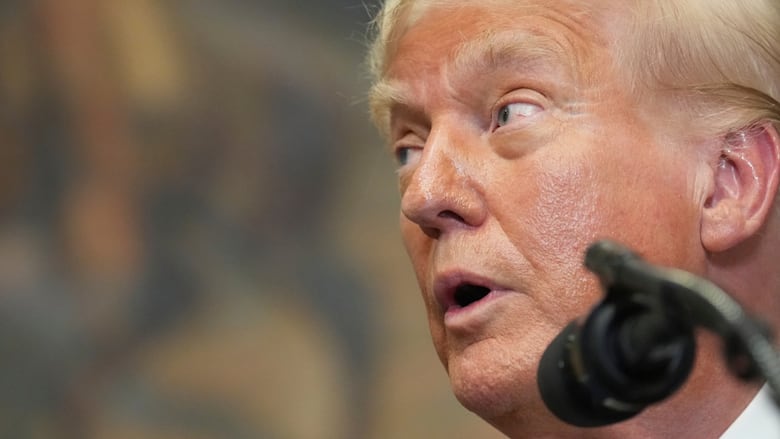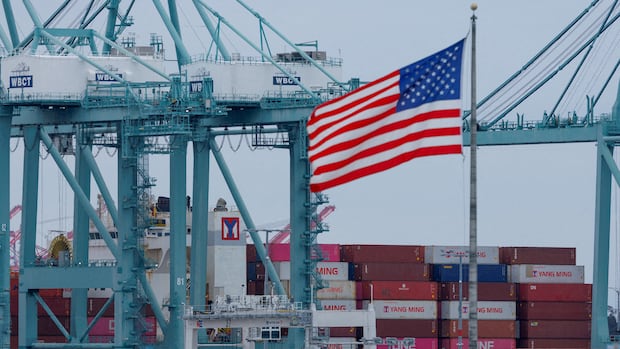U.S. extends trade deal with Mexico, sets tariffs for dozens of countries
Trump also boosts tariffs on Canada to 35% for goods that don't meet terms of CUSMA

U.S. President Donald Trump signed an executive order on Thursday imposing "reciprocal" tariffs ranging from 10 per cent to 41 per cent on U.S. imports from dozens of countries and foreign locations.
The order was issued shortly after 7 p.m. ET on Thursday evening. It came after a flurry of tariff-related activity in the last several days, as the White House announced agreements with various nations and blocs ahead of the president's self-imposed Friday deadline.
Rates were set at 25 per cent for India's U.S.-bound exports, 20 per cent for Taiwan's and 30 per cent for South Africa's, as listed in a table in the executive order.
On the higher end of the listed tariffs, Syria's rate was written as 41 per cent, while both Laos and Myanmar were assigned tariffs of 40 per cent. Switzerland was at 39 per cent, according to the order.
Separate from that executive order, Trump moved Thursday to increase a tariff on Canadian goods to 35 per cent, as he had threatened to do. However, Canadian goods that meet the terms of the Canada-U.S.-Mexico Agreement (CUSMA) will not be subject to the tariff, which means the vast bulk of Canada's exports can still cross the border tariff-free.
Here are key developments:
Mexico
Trump said Thursday that he had agreed with Mexican President Claudia Sheinbaum to extend an existing trade deal with Mexico for 90 days and continue talks over that period with the goal of signing a new deal.
"Mexico will continue to pay a 25% Fentanyl Tariff, 25% Tariff on Cars, and 50% Tariff on Steel, Aluminum, and Copper. Additionally, Mexico has agreed to immediately terminate its Non Tariff Trade Barriers, of which there were many," Trump said in a Truth Social post.
Any goods covered by CUSMA would remain tariff-free, Sheinbaum said.
Mexico had faced the prospect of a 30 per cent tariff from Trump set to start Friday, something the country now gets to stave off for another three months.
Sheinbaum said at her daily media briefing that she and Trump had continued to "negotiate and work as equals."
"It was a good agreement, because we simply stay like we are with nothing additional," she said.
South Korea
Trump had said the U.S. will charge a 15 per cent tariff on imports from South Korea, including autos, as part of a trade deal, a figure that is down from the original 25 per cent. The lower 15 per cent figure was the one listed in the executive order the U.S. president signed on Thursday.
He also said South Korea would accept American products, including autos and agriculture, into its markets and impose no import duties on them.
The U.S. agreed that South Korean firms would not be put at a disadvantage compared with other countries over upcoming tariffs on chips and pharmaceutical products, while retaining 50 per cent tariffs on steel and aluminum.
Trump said South Korea would invest $350 billion in the U.S. in projects "owned and controlled by the United States" and selected by Trump.
South Korea said $150 billion has been earmarked for shipbuilding co-operation, while investments in chips, batteries, biotechnology and nuclear energy co-operation accounted for the remaining $200 billion.
Trump said South Korea would purchase $100 billion worth of liquefied natural gas or other energy products, which the Asian country said would mean a slight shift in energy imports from the Middle East in the next four years.
Brazil
Trump hit Brazil on Wednesday with a steep 50 per cent tariff as he escalated his fight with Latin America's largest economy over its prosecution of his friend and former Brazilian president Jair Bolsonaro, but softened the blow by excluding sectors such as aircraft, energy and orange juice from heavier levies.
Taiwan
Taiwan's president Lai Ching-te said Taiwan had yet to engage in final negotiations with the U.S. due to scheduling difficulties, but added that he was hopeful the final tariff rate would be reduced even further after a final round of talks.
The Trump administration initially hit Taiwan with 32 per cent tariffs, but lowered it to 20 per cent Thursday. Negotiations have included talks on working together on high-tech supply chains, Lai said in his statement.
The U.S. is Taiwan's most important export market and strategic ally, he said.
Lesotho
The small African country Lesotho received a modified tariff rate of 15 per cent Thursday from Trump as the nation continued to reel from high tariffs the administration had threatened to implement earlier this year.
Lesotho had been under threat of a 50 per cent rate since April, the highest of any U.S. trading partner.
The Trump administration defended its tariff rate on the mountain kingdom in southern Africa as reciprocal, stating that Lesotho charged 99 per cent tariffs on U.S. goods.
Lesotho officials have said they do not know how the White House arrived at that figure.
New Zealand
New Zealand officials said they would lobby the administration for a change to the 15 per cent tariff announced for the country's exporters to the U.S. It's an increase from the original 10 per cent baseline announced for New Zealand in April.
"We don't think this is a good thing. We don't think it's warranted," Trade Minister Todd McClay told Radio New Zealand Friday.
He said New Zealand appeared to have been targeted for a larger levy because the country records a trade deficit with the U.S., but that the gap of about half a billion dollars each year was "not significant or meaningful."
India
Goods from India appeared to be headed for a 25 per cent tariff after talks bogged down over access to India's agriculture sector, drawing a higher-rate threat from Trump that also included an unspecified penalty for India's purchases of Russian oil.
Although negotiations with India were continuing, New Delhi vowed to protect the country's labour-intensive farm sector, and the threat of higher rates from Trump triggered outrage from the opposition party and a slump in the rupee.
European Union
The European trading bloc struck a political agreement last weekend that would see 15 per cent duties imposed on about two-thirds of EU produce, worth about 380 billion euros ($601 billion Cdn).
That deal hasn't yet been put on paper in full. European Commission spokesperson Olof Gill said the two sides were still working on a joint statement that would lay out the terms of their understanding.
The European Union is working on the assumption that the U.S. will impose a 15 per cent tariff on most EU exports beginning on Friday, even though the two sides have yet to complete the key documentation that would clarify how the deal will operate.
"It is the clear understanding of the European Union that the U.S. will implement the agreed across-the-board tariff ceiling of 15 per cent," Gill said. The commission negotiates trade terms on behalf of the the EU's 27 member countries.
With files from CBC News and The Associated Press



